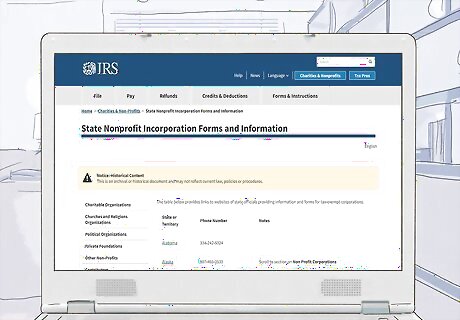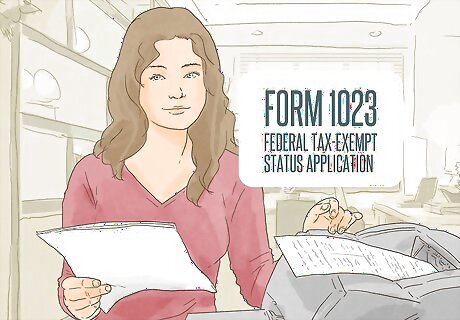
views
Organizing Your Shelter

Find a location for your shelter. Ideally, someone will donate a building to you. Otherwise, you'll need to pay rent, which can make it hard to run a homeless shelter. Drive around the neighborhood and check for abandoned buildings. You can find the owner by visiting the county assessor's office and checking tax records. Also make requests for a donation through media, such as radio/TV shows, newspapers, and social media. You can only have a shelter in an area zoned for it, so check zoning laws as well.

Walk through the buildings. Your building should have bathrooms and working showers for the residents. Some homeless shelters have individual showers, but many have communal showers. When you visit a building, check the plumbing and confirm there is enough space to install showers. Decide whether you want to provide meals to your residents as well. If you do, there needs to be a working kitchen where you can prepare food. You'll also need space for residents to eat, which should be separate from the sleeping area.

Partner with another nonprofit. Talk to nonprofits in your area and discuss your interest in starting a homeless shelter. They might give you tips about how to get off the ground. They might also have funds you can use to defray start-up costs. Consult with religious institutions, such as churches, synagogues, and mosques. Their values should align with yours, so they might be particularly eager to help you start a homeless shelter.

Find financing. If you can't get another nonprofit to fund you, you'll need to find funds on your own. This can be a challenge. You can apply for government grants, which you can find online. In the U.S., check grants.gov and usa.gov. Consider other sources of funding: Friends and family. Show them your proposal in which you explain why you are starting the homeless shelter and how you will use the money. Donors. People who don't know you might donate to the homeless shelter. They'll need some way to find you, so you might want to create a website. Set up the website so that you can accept Paypal.

Get legal help. You need to jump through many hoops to start your homeless shelter. You'll need expert legal advice, which only a qualified attorney can provide. Although money might be tight, you should still look for a lawyer. Some lawyers are happy to provide services pro bono to nonprofits. Talk to a local attorney and ask if they know someone willing to work pro bono.

Prepare a mission statement. Clearly outline your intentions, goals, and services. Identify the number of individuals you can shelter and whether you will offer a food pantry, pet assistance, or career counseling. Your mission statement can be anywhere from a few sentences to a few pages.
Completing Legal Requirements

Incorporate. You'll need to file paperwork with your jurisdiction to become a nonprofit corporation. In the U.S., you should file articles of incorporation. Your state's Secretary of State website should have “fill in the blank” forms you can use. Find the correct website at https://www.irs.gov/charities-non-profits/state-nonprofit-incorporation-forms-and-information. Your articles will require basic information about your corporation, e.g., your name, principal place of business, and a registered agent who can accept legal papers. Submit your articles to the address provided along with your fee. Each jurisdiction sets its own fees, but plan on spending a couple hundred dollars.

Draft bylaws. Your bylaws are your nonprofit's operating manual. You probably don't need to file them with your jurisdiction, but you should keep them at your principal place of business. Nonprofit bylaws should contain the following: Basic information, such as your corporate name and the location of your principal office. A description of your business purpose. An explanation of how you are dedicating your nonprofit's assets. For example, if you dissolve, you will probably give your assets to another nonprofit. The number of directors, as well as their qualifications and duties. The number of officers, including information about how they will be elected, their duties, and compensation. A well-developed conflict of interest policy, which is meant to protect your nonprofit from being taken advantage of by directors, officers, and other insiders.

Get a business license. Contact your city or county government to get the applicable business license. Generally, you'll need to provide your name, contact information, tax ID number, and number of employees. You usually must pay a fee.

Obtain a tax ID. Even though you're a nonprofit, you'll still need a tax ID. In the U.S., you should get your Federal Employer Identification Number (FEIN) from the IRS. You can get it online: https://www.irs.gov/businesses/small-businesses-self-employed/apply-for-an-employer-identification-number-ein-online.

Apply for federal tax-exempt status. U.S. nonprofits should download the application from the IRS website: Form 1023, Application for Recognition of Exemption Under Section 501(c)(3). If you're a smaller nonprofit, check whether you can file Form 1023-EZ. You'll need to provide financial information. If you're a new nonprofit, you must provide financial data for every year you've been in existence and estimates for future years. You may need an accountant to help you. You should file for tax-exempt status within 27 months of filing your articles of incorporation. If you do, your tax-exempt status is retroactive to the date you filed your articles. Once you are approved, you'll receive a determination letter. Hold onto this, since you will probably need to show it to many people.

Apply for state tax-exempt status. In the U.S., you might also need tax-exempt status from your state. Contact your state's tax agency. Generally, you'll need to complete an application and submit a copy of your federal determination letter.
Preparing to Open

Obtain insurance. Many things could go wrong in the shelter. For example, a resident might slip and fall or residents might become violent. In any event, you'll need to get insurance to protect you. You can obtain a policy by find an insurance agent in your phone book. Also talk to other homeless shelters about what insurance they carry.

Appoint directors to the board. Your directors will make major financial and policy decisions for your homeless shelter. Your jurisdiction should set the number of directors you must have. However, in the U.S., you should have at least three. Find people with skills that will benefit your homeless shelter. For example, a former manager of a homeless shelter might make a great director. Prominent business people also make good directors. They know other business owners in the community and can raise your profile.

Convene an board of directors meeting. At your initial meeting, the directors should take care of the following tasks: Adopt your bylaws. Appoint officers, such as President, Vice President, Treasurer, and Secretary. In a small nonprofit, one person can take on more than one role. Note that you have received tax-exempt status. Authorize someone to open a bank account for the homeless shelter.

Hire volunteers. One or two people can't run a homeless shelter on their own. Instead, you'll need plenty of volunteers who can work at night and in the morning. Advertise for volunteers in your local newspaper and online. If you partner with a religious institution, you can ask its members to volunteer. Request an opportunity to speak to the congregation about your homeless shelter.

Train volunteers. Contact a nearby shelter and ask if they can send someone over to give trainings on how to run things. Staff will need to check in residents, handle violent or unstable residents, and keep the shelter clean. You should make sure staff receives all necessary training. Your staff also needs to be aware of state laws regulating homeless shelters. For example, in some states, the homeless are given ID numbers. Your staff will need to enter this information into a computer system.

Hire employees. You might not be able to get by with only volunteers. Instead, you might need to hire full- or part-time staff, such as janitors, cooks, security guards, etc. Comply with your jurisdiction's laws regarding hiring employees. In the U.S., you'll need to report all new hires to your state's New Hire Reporting office within 20 days. This is required for all full- or part-time employees but not independent contractors. You should register for an account with your state office. You could hire and train homeless veterans, as veterans, in particular, are reliable. The expectation is that they're reliable and sober and ready to work every day. You may also need to buy workers' compensation insurance. Talk to your insurance agent.

Ask for food donations. Go to grocery stores and tell them about your homeless shelter. Ask if they can donate any food to your kitchen. Make sure to take copies of your legal documents with you to show that you are a legitimate nonprofit. Business owners will want to see your nonprofit determination letter as well as your business license and articles of incorporation.

Request donations for other items. Your homeless shelter will need cots, pillows, blankets, toys, and other items. Ask businesses in the community if they are willing to donate. You should visit in person, which will give you a chance to talk about your shelter. However, also cast a wider net. Write a letter to your local Chamber of Commerce describing your homeless shelter and stating what you need. They can share your letter with members. Also consider giving an interview to local media. Point out that you are a nonprofit and you are accepting donations.




















Comments
0 comment